R.O.K. Joint Chiefs of Staff
JCS News
- Home
- JCS News
Latest News

-
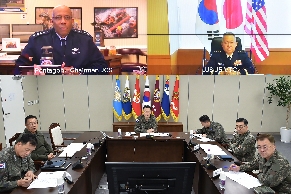
- Joint Statement of the United States-Japan-Republic of Korea Tri... (2024.03.28)
- ○Chairman of the Joint Chiefs of Staff Gen. CQ Brown, Jr.; Chief of Staff, Japan Joint Staff, Gen. Yoshihide Yoshida; and Chairman of the Republic of Korea Joint Chiefs of Staff, ADM Kim Myung-soo spoke today by video teleconference.
○The chiefs of defense discussed trilateral cooperation initiatives, global security issues, and recent Democratic People’s Republic of Korea(DPRK) provocations.
○The three leaders applauded mutual efforts in achieving the trilateral initiatives on real-time missile warning data sharing mechanism, and on establishing a multi-year trilateral exercise plan based on the 2023 Camp David Summit and Trilateral Defense Ministerial Meeting.
○The leaders also agreed that the DPRK’s provocative actions including nuclear and missile developments reflect the importance of increasing the depth, scale, and scope of trilateral cooperation by the United States, Japan, and the Republic of Korea.
○Gen. Brown reaffirmed U.S. commitment to defending Japan and the Republic of Korea. The leaders recognized that trilateral cooperation helps ensure peace and stability on the Korean Peninsula, in the Indo-Pacific, and beyond.
○The leaders look forward to holding the next trilateral chiefs of defense meeting this summer.
-
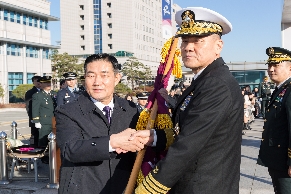
- The Change of Command Ceremony for 43rd and 44th CJCS (Nov 25, 2... (2023.11.27)
- ㅇ The Change of Command Ceremony for 43rd and 44th CJCS, and Farewell Ceremony in honor of GEN Kim, Seung Kyum was held in on 15:00 November 25th(SAT) at the JCS Parade Grounds. Among those in attendance were the Minister of National Defense, Commander of the ROK-U.S.Combined Forces Command, other distinguished guets, and JCS service members. Through his inaugural address, Admiral Kim, Myung Soo declared his resolve to "establish Leading Posture and Overwhelming Capabilities" to win every battle and fulfill every mission while maintaining a "Stay Vigilant, Fight Ferociously"mentality.
-
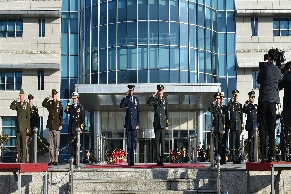
- 48th ROK-US Military Committee Meeting Held in Seoul (2023. 11. ... (2023.11.13)
- On November 12(Sun), GEN. Kim, Seung-Kyum, Chairman of ROK Joint Chiefs of Staff met with Gen. Charles Q. Brown Jr., Chairman of the US Joint Chiefs of Staff during the 48th ROK US Military Committee Meeting(MCM) in the ROK Joint Chiefs of Staff. This marks Gen. Brown's first visit to Korea since he took office on October 1, 2023. GEN. Kim Seung-Kyum, Chairman of the ROK JCS and Lt Gen. Jin Young-Seung, Chief Director of J5, ROK JCS, represented the ROK delegation and Adm. John C. Aquilino, commander, US INDOPACOM, joined Gen. Brown as part of the US delegation. Gen. Paul J. LaCamera, commander, United Nations Command(UNC), Combined Forces Command(CFC), United States Forces Command(USFK), represented the ROK-US CFC. During the discussions, Gen. Brown and GEN. Kim recognized the significance of the ironclad US-ROK Alliance reaching its 70th anniversary. This important milestone underscores the shared sacrifice and commitment of the Alliance in maintaining peace and stability on the Korean Peninsula. The two leaders discussed the continuous provocations of the Democratic People's Republic of Korea(DPRK), including missile launches and nuclear threat, and key security issues that destabilize peace and security in the region. In particular, Gen. Brown reaffirmed the US commitment to extended deterrence and the defense of the ROK. Both leaders also acknowledged the meaningful progress made in the conditions-based operational control(OPCON) transition plan, to include completing this year's annual US-ROK bilateral evaluations concerning capabilities and systems. The two leaders shared the importance of developing an ever-stronger mutual defense relationship and affirmed in the strongest words possible their commitment to the combined defense posture under the US-ROK Mutual Defense Treaty. The United States and the ROK are committed to peace and stability on the Korean Peninsula and the region. The MCM is part of the US-ROK bilateral consultation process, which convenes annually or as required. The committee provides strategic directives and operational guidance to the CFC in defense of the ROK and addresses Alliance military issues. The US and the ROK have alternated hosting this meeting in Washington, D.C. and Seoul, since it first convened in 1978.
-
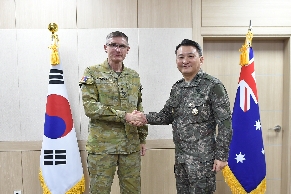
- GEN Kim Seung Kyum, CJCS Hosts Office Call with GEN Angus Campbe... (2023.08.28)
- ○ Chairman Kim Seung Kyum hosted General Angus Campbell, Chief of the Australian Defence Force for an office call on Monday August 28, 2023.
○ As ROK-US combined exercise UFS 23 continues on, Chairman Kim and General Campbell discussed ① their assessments of the security landscape in the Korean Peninsula, ② DPRK's military threat, including their nuclear weapons and missiles, and response measures, and ③ ways to promote military cooperation between the two countries.
○ In particular, the two military leaders agreed that DPRK's illegal military provocations, including their recent launch of "self-purported satelite launch vehicle", various missile launches, and UAV incursions, and blatant threat of nuclear use are adversely threatening peace not only in Korean Peninsula and the Indo-Pacific but also the rest of the world.
○ Meanwhile, Chairman Kim conveyed his gratitude for Australia's participation in UFS 23 and contribution to peace and stability in the Korean Peninsula as a UNC member state. Additionally, he expressed his hopes for ROK-Australia military cooperation to develop to new heights through various trainings and military exchange.
○ Australia is a traditional friend and partner of the Republic of Korea that contributed 17,000 troops during the Korean War, and through summit talks in May of this year, the two countries agreed to strengthen strategic communication and pursue close cooperation for the promotion of peace in the region. ROK and Australia have sustained close exchange and cooperation in various fields including military, diplomacy, and economy.
-
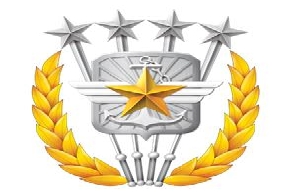
- Vice Chairman, R.O.K. Joint Chiefs of Staff, participates in 'In... (2023.08.14)
- ○Lt. Gen. Park Woong, Vice Chairman of the Republic of Korea Joint Chiefs of Staff, participates in 'Indo-Pacific CHOD Conference' held in Fiji, from 14 to 16 August, 2023, on behalf of GEN Kim Seung Kyum, Chiarman of ROK JCS.
○This year's conference, bilaterally hosted by US INDOPACOM and Fiji Military Forces, is an annual event to strengthen the bonds between Indo-Pacific CHODs and to enhance mutual military cooperation. The military leaders from 28 nations in the region and NATO will participate.
○The main agendas are △efforts to uphold the international rules-based order, △response to cyber and information related risks, △tools for developing resilient communities in responding to national disasters and climate change.
○Vice Chairman will share the security situation of the Korean Peninsula and discuss ways for military cooperation through bilateral dialogues with the military leaders of Indo-Pacific region, such as the US, UK, France, Australia, Fiji, and NATO.
○This year's Indo-Pacific CHOD Conference will be an opportunity to further strengthen the coordination with the global community, such as the enhancement of the military cooperation with Indo-Pacific nations and NATO, and the deterrence of the nuclear・WMD threats of the North.
22, Itaewon-ro, Yongsan-gu, Seoul 04383
Copyright©2015 ROK Joint Chief of Staff.
ALL RIGHT RESERVED.


